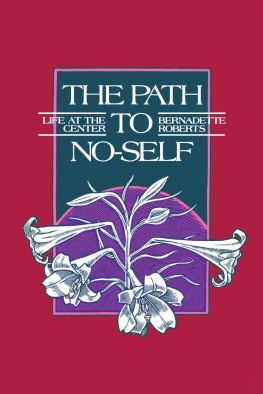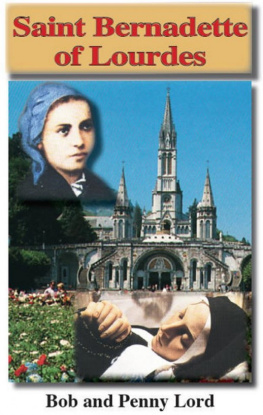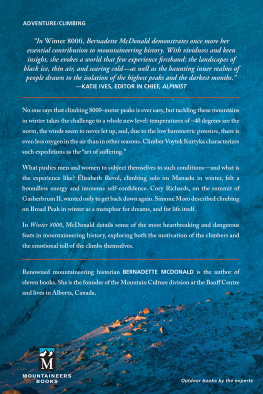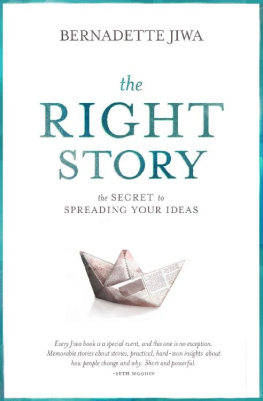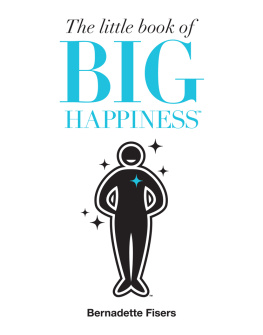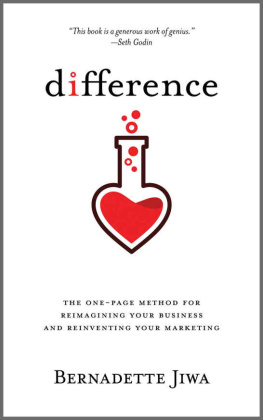Bernadette Roberts - The Experience of No-Self: A Contemplative Journey
Here you can read online Bernadette Roberts - The Experience of No-Self: A Contemplative Journey full text of the book (entire story) in english for free. Download pdf and epub, get meaning, cover and reviews about this ebook. year: 1993, publisher: State Univ of New York Pr, genre: Religion. Description of the work, (preface) as well as reviews are available. Best literature library LitArk.com created for fans of good reading and offers a wide selection of genres:
Romance novel
Science fiction
Adventure
Detective
Science
History
Home and family
Prose
Art
Politics
Computer
Non-fiction
Religion
Business
Children
Humor
Choose a favorite category and find really read worthwhile books. Enjoy immersion in the world of imagination, feel the emotions of the characters or learn something new for yourself, make an fascinating discovery.

- Book:The Experience of No-Self: A Contemplative Journey
- Author:
- Publisher:State Univ of New York Pr
- Genre:
- Year:1993
- Rating:3 / 5
- Favourites:Add to favourites
- Your mark:
- 60
- 1
- 2
- 3
- 4
- 5
The Experience of No-Self: A Contemplative Journey: summary, description and annotation
We offer to read an annotation, description, summary or preface (depends on what the author of the book "The Experience of No-Self: A Contemplative Journey" wrote himself). If you haven't found the necessary information about the book — write in the comments, we will try to find it.
The Experience of No-Self: A Contemplative Journey — read online for free the complete book (whole text) full work
Below is the text of the book, divided by pages. System saving the place of the last page read, allows you to conveniently read the book "The Experience of No-Self: A Contemplative Journey" online for free, without having to search again every time where you left off. Put a bookmark, and you can go to the page where you finished reading at any time.
Font size:
Interval:
Bookmark:
The Experience of No-Self
A Contemplative Journey
Revised Edition
Bernadette Roberts
State University of New York Press
Published by
State University of New York Press, Albany
1993 by Bernadette Roberts
Roberts, Bernadette, 1931
The experience of no-self : a contemplative journey / Bernadette Roberts. Rev. ed.
p. cm.
ISBN 0-7914-1694-1 (pbk. : alk. paper)
1. Contemplation, Case studies. 2. Depersonalization
Religious aspects Christianity Case studies. 3. Roberts,
Bernadette, 1931-. 4. Catholics, United States, Biography.
I. Title.
To contemplatives East and West, especially those who dwell on the spiritual mountains of Carmel and New Camaldoli
INTRODUCTION
This is the personal account of a two-year journey during which I experienced the falling away of everything I can call a self. It was a journey through an unknown passageway that led to a life so new and different that, despite forty years of varied contemplative experiences, I never suspected its existence. Because it was beyond my expectations, the experience of no-self remained incomprehensible in terms of any frame of reference known to me, and though I searched the libraries and bookstores I did not find there an explanation or an account of a similar journey which, at the time, would have been clarifying and most helpful. Owing then to the deficiency of recorded accounts, I have written these pages trusting that they may be of use to those who share the destiny of making this journey beyond the self.
Though my contemplative experiences began at an early age, it was not until I was fifteen that I discovered how these experiences fit like the inset of a child's puzzle into the larger framework of the Christian contemplative tradition. This finding was followed by ten years of relative seclusion in order to pursue the Christian goal of union with God, and once I had the certitude of this goal's realization, I entered the more ordinary stream of life where I remain to this day.
Within the traditional framework, the Christian notion of loss-of-self is generally regarded as the transformation or loss of the ego (lower self) as it attains to the higher or true self in its union with God. In this union, however, self retains its individual uniqueness and never loses its ontological sense of personal self-hood. Thus being lost to myself meant, at the same time, being found in God as the sharer of a divine life. From here on, the deepest sense of being and life is equally the sense of God's being and life. Thus there is no longer any sense of "my" life, but rather "our" life, God and self. In this abiding state God, the "still-point'' at the center of being, is ever accessible to the contemplative gaze, a point from which the life of self arises and into which it sometimes disappears. But this latter experience of loss-of-self is only transient, it does not constitute a permanent state, nor did it occur to me that it could ever do so in this life.
Prior to this present journey, I had given little thought to the self, its perimeters or definitions. I took for granted the self was the totality of being, body and soul, mind and feelings; a being centered in God, its power-axis and still-point. Thus, because self at its deepest center is a run-on with the divine, I never found any true self apart from God, for to find the One is to find the other.
Because this was the limit of my expectations, I was all the more surprised and bewildered when many years later I came upon a permanent state in which there was no self, no higher self, true self, or anything that could be called a self. Clearly, I had fallen outside my own, as well as the traditional frame of reference, when I came upon a path that seemed to begin where the writers on the contemplative life had left off. But with the clear certitude of the self's disappearance, there automatically arose the question of what had fallen away, what was the self? What, exactly, had it been? Then too, there was the all-important question: what remained in its absence? This journey was the gradual revelation of the answers to these questions, answers that had to be derived solely from personal experience since no outside explanation was forthcoming.
With the exception of the little I could find by Meister Eckhart, I was left without a way to account for this experience, and even when I turned to books in the Eastern traditions, I encountered the same deficit of accounts, at least accounts that were available to me through the local channels. Though the Buddhist notion of no-self struck me as true, its failure to acknowledge, or first come upon the wholeness of the self in its union with God, naturally left the Christian experience of no-self unaccounted for. Quite possibly, the extent to which the individual first discovers this union is the extent to which its falling away will appear all the more inexplicable and bewildering. It is only when this transition is over, or when we have become acclimated to a new life, that the relative difference between self and no-self recedes beyond reach; but by this time, we have already seen what is down the road and the need for clarification no longer exists.
Realizing then, that I was alone in this gap between the ultimate Christian notion of loss-of-self and its immediate experience, I came to a few conclusions of my own. In main, I am convinced that the contemplative life is composed of two distinct and separate movements well marked and defined by the nature of their experiences alone. The first movement is toward self's union with God which seems to run parallel with the psychological process of integration, wherein the emphasis is on interior trials and dark nights by which the self is established in a permanent union with God, the still-point and axis of its being. In this process we discover that self is not lost; rather, a new self is revealed that functions from the deepest, innermost divine center.
Following this first movement is an interval (twenty years in my case) during which this union is tested by a variety of exterior (not interior) trials whereby this oneness is revealed in all its enduring depths of stability and toughness against all forces that would move, fragment, or disturb its center. Thus it is a period of discovering the beauty and intense wonder of this gratuitous union and, above all, of discovering what this wholeness means and how it works in our daily lives in the marketplace. Initially it is a period of becoming acclimated to the relative difference between life with the old, easily fragmented self, and life with a new self that cannot be moved from its center in God. Finally, this is a stage in which, if exterior trials are not forthcoming, the contemplative may seek them because the energy created by this union must move outward (as a unit and not as a scattered force) to find expression, to accept challenge, even suffering, as a way to both reveal and affirm this enduring love.
I might add that these intervening years between movements are also largely ignored in contemplative literature; their importance is highly underestimated due to the failure to realize that this interval (the "marketplace stage") is actually the preparation for a great explosion, a quiet one, however, that ushers in another major turning-point. It seems that at the end of the marketplace a point is reached where the self is so completely aligned with the still-point that it can no longer be moved, even in its first movements, from this center. It can no longer be tested by any force or trial, nor moved by the winds of change, and at this point the self has obviously outworn its function; it is no longer needed or useful, and life can go on without it. We are ready to move on, to go beyond the self, beyond even its most intimate union with God, and this is where we enter yet another new life, a life best categorized, perhaps, as a life without a self.
Font size:
Interval:
Bookmark:
Similar books «The Experience of No-Self: A Contemplative Journey»
Look at similar books to The Experience of No-Self: A Contemplative Journey. We have selected literature similar in name and meaning in the hope of providing readers with more options to find new, interesting, not yet read works.
Discussion, reviews of the book The Experience of No-Self: A Contemplative Journey and just readers' own opinions. Leave your comments, write what you think about the work, its meaning or the main characters. Specify what exactly you liked and what you didn't like, and why you think so.

